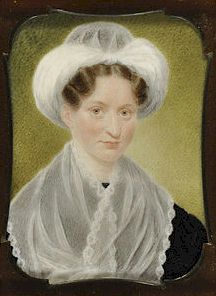|
 |

Part of the American
History & Genealogy Project |
Mary Lyon 1797 ~ 1849


Mary Lyon
While still very young, Mary Lyon, who
was afterwards to become the foremost woman in America in the
mental and spiritual training of young girls, wrote a letter to
her sister revealing not only the strength of her thought and
the intensity of her patriotism, but the deep bed rock of
Christian faith which undergirded all her thinking. "This day,"
she wrote, "completes half a century since the Declaration of
Independence. How interesting must be the reflections of those
few who remember that eventful day. Who on the face of the earth
fifty years ago could have expected such results? It is true
that Washington and almost all Americans who lived in the days
of Washington hoped for independence, but did they look forward
to this time and expect such a nation as this? Must not all
believe that self-promotion comes neither from the east nor from
the west nor from the south, but God is the Judge who putteth
down one and setteth up another. Must not all exclaim. This is
the finger of God!'' This same spirituality of her mind was made
manifest later in her influence over all those whom she taught.
As time went on and Mary Lyon became
more and more entrenched in her life work of teaching, her
spiritual life deepened and her activities were intensified in
two or three very important ways. She was deeply imbued with the
importance of instruction in Bible truths, and in the conversion
of her pupils, and more and more impressed with the importance
of loyalty and self-sacrifice for the promotion of foreign
missions. I think she was the pioneer in what is now quite
common in Christian colleges, a definite laboring for the
conversion of students as an important part of the college work.
It was her custom to write to Christian friends in all parts of
the country and enlist their prayers for the spiritual condition
of her school. She had wonderful faith in prayer, and the
results justified her faith. Mary Lyon's power in developing
Christian character in her pupils lay in the fact that she not
only lived a Christian life herself, but regularly taught it to
her pupils. Her manner was simple; there was not the slightest
pretense of speaking for effect or trying to speak eloquently,
but her intense faith and earnestness made her a powerful
speaker. Doctor Hitchcock, at one time president of Amherst
College, says that the vividness with which she evidently saw
and thought the truths she was telling was only second to her
power. If she ever had a fleeting doubt of the certainty of
future retribution that doubt was never known or suspected by
her most intimate friends. The foundations of faith never
wavered. The principles of the Christian religion seemed
interwoven in the fibers of her soul. The world to come was as
present to her thoughts as this world to her eyes. Her
confidence in God was as simple and true as a child's in its
mother.
Mary Lyon had broad and noble ideas
concerning the necessity for the education of woman and the
possible blessings that would come from it to the world. On one
occasion when she was under the strain of great effort to obtain
needed help for Mt. Holyoke Female School (the institution of
which she was the founder is now known as Mt Holyoke College)
she wrote a letter to a leading minister, in the course of which
she said: "Woman elevated by the Christian religion was designed
by Providence as the educator of our race. From her entrance
into womanhood to the end of her life this is to be her great
business. By her influence not only her friends, her scholars
and her daughters are to be affected, but also her sons, her
brothers, the young men around her, and even the elder men, not
excepting her father and his peers. Considering the
qualifications which the mothers in our land now possess is
there not a call for special effort from some quarter to render
them aid in fitting their daughters to exert such an influence
as is needed from this source in our infant Republic, on our
Christian country?" Such a letter would not seem daring now, but
it took a prophetess to write it twenty years ago. Miss Lyon's
work in behalf of foreign missions was so immense that it can
only be referred to in this short sketch of her life. So many
missionaries went out from her seminary that worldly families
became afraid to send their daughters there to school lest they
should give themselves to Christian work. After her death, in
1849, one writer suggested the breadth of her missionary work in
these words, "Is she missed? Scarcely a state in the American
Union but contains those she trained. Long ere this, amid the
hunting grounds of the Sioux and the villages of the Cherokees
the tear of the missionary has wet the page which has told of
Miss Lyon's departure. The Sandwich Islander will ask why his
white teacher's eyes dim as she reads her American letters. The
swarthy African will lament with his sorrowing guide, who cries,
'Help, Lord, for the Godly ceaseth!' The cinnamon groves of
Ceylon, and the palm trees of India overshadow her early
deceased missionary pupils, while those left to bear the heat
and burden of the day will wail the saint whose prayers and
letters they so prized. Among the Nestorians of Persia, and at
the base of Mount Olympus will her name be breathed softly as
the household name of one whom God hath taken."
Women of
America

Source: The Part Taken by Women in
American History, By Mrs. John A. Logan, Published by The Perry-Nalle
Publishing Company, Wilmington, Delaware, 1912.
|